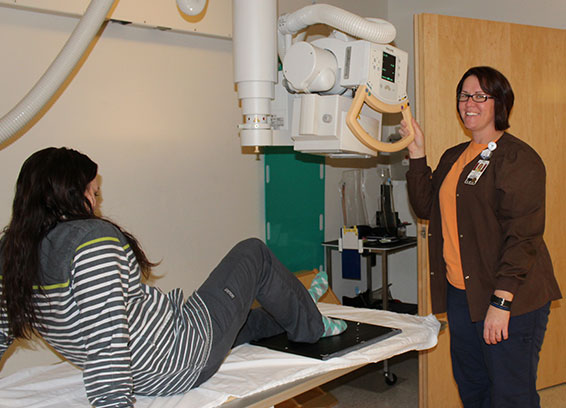3D MAMMOGRAPHY: Advanced technology for breast health offered here at Wayne County Hospital.
Advantages of 3D mammography include:
- Better breast cancer detection
- Fewer false positives
- More peace of mind
3D mammography provides a clearer picture of breast health, especially for women with dense breast tissue.
Imaging procedures provide ‘pictures / images’ of internal organs, bones, tissues, etc. to aid in the diagnosis and treatment of injuries and illness. The use of medical imaging provides earlier detection and often a more effective treatment protocol for a wide range of life threatening conditions including heart disease, cancer, stroke and lung disease.
Conveniently located adjacent to the Emergency Department ensures quick access to patients in need of emergent imaging services.
To schedule an appointment or for more information on Imaging / Radiology Services please call 641-872-5211.

DEXA-SCAN: Detecting Osteoporosis
As we age, the threat of bone fractures, osteoporosis and losing height become more of a reality. These conditions can be predicted, slowed down and even prevented through a simple, painless radiological DEXA-Scan exam available locally at the Wayne County Hospital. Highly qualified and experienced registered technologists perform the exam in our Outpatient Imaging Services Department.
DEXA-Scan measures bone density, which is directly related to bone strength. Doctors can predict the potential for fracture and osteoporosis through DEXA-Scan results. Osteoporosis is a gradual loss of calcium in the bones, which causes them to become less dense, therefore more fragile and much easier to break.
DEXA-Scan uses an extremely low dose of radiation — one-quarter to one-tenth that of a regular chest X-ray — and is considered safe for use on any age patient.
DEXA-Scan is so sensitive, it picks up tiny fractures in the spinal column and can detect as little as 1% bone loss in the spine, hips and extremities, usually the wrist. It is the gold standard of diagnosing bone mass and is instrumental in helping physicians find osteoporosis before a fracture occurs.
Who needs one?
Generally, women over 50 should get a DEXA-Scan, although it’s good for those in their early 40’s to have a baseline scan for comparison in the years to come.
Men and children can also benefit from a bone density test as bone loss can strike anyone. Risk factors include:
- Natural or surgical menopause
- Prolonged Hormone Replacement Therapy
- Previous fracture
- Medication use including steroids and hormones
- Caucasian or Asian descent
- Thin or small build
- Family history of osteoporosis
- Smoking
- Alcohol Abuse
- Inactive lifestyle
- Inadequate calcium intake

What can I expect?
A bone density scan is a simple, painless and non-invasive procedure. It uses an extremely low dose of radiation and takes approximately 15 minutes.
During your DEXA-Scan, you will be asked to wear a comfortable, two-piece outfit that has no metal buckles, buttons or zippers. A sweat-suit works very well. You will likely not be asked to change into a robe or drape.
You will be asked to lie on your back on a padded exam table. At some point, your legs will be elevated. During your exam, an overhead arm which houses the camera will travel above your body to take the readings. It is most important that you lie completely still so that images are clear and crisp. You can breathe normally.
After your study is complete, a board certified radiologist will evaluate the image results and send a full report to your doctor, who will discuss the results with you. Your physician will contact you with results of the scan.
For more information on bone health check out:
National Osteoporosis Foundation
National Institutes of Health (Bone Density & Osteoporosis Site)
What about the results?
Your DEXA-Scan will generate a computerized printout with pictures and an explanation of the images for you and your doctor to discuss.
If osteoporosis or tiny fractures are found, you and your healthcare provider will map out a plan of action which may include medication and the following lifestyle changes…
- Increased calcium and vitamin D intake
- Weight bearing exercise such as walking and stair climbing
- Strength training such as lifting weights — even soup cans or plastic bottles filled with water
- Stretching exercises for balance, posture and agility
- A well-balanced diet
- Stop smoking
- Reducing amount of colas and caffeinated drinks
- Follow-up DEXA-Scans to keep track of bone health
Remember, DEXA-Scan can diagnose osteoporosis in the early stages before broken bones can occur. Don’t take chances with your health. Prevent bone loss and have your bone density checked by a trained professional. Consult your family practitioner at the Wayne County Hospital Clinic System and call 641-872-2063 for your appointment.

